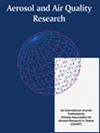Comparison of Aerosol Acidity Based on a Direct Measurement Method and a Chemical Thermodynamic Model
IF 2.5
4区 环境科学与生态学
Q3 ENVIRONMENTAL SCIENCES
引用次数: 0
Abstract
Aerosol acidity is an important parameter in aerosol science that affects many chemical reactions in the atmosphere, and it is often estimated using chemical thermodynamic models. The Extended Aerosol Inorganic Model IV (E-AIM IV) is frequently used for this purpose; however, due to the limited number of available direct measurement methods of aerosol acidity, there is still a certain degree of uncertainty with regard to how accurately the simulation results reflect reality. In this study, a new pH testing paper method for the direct measurement of aerosol pH is used to measure the pH (pHmeas) of aerosol particle samples. Based on the data of the ionic constituents of the samples, the E-AIM IV model is then used to estimate aerosol pH (pHest). This study provides a comparison of pHmeas and pHest, revealing that the relationship is satisfactorily approximated by a simple linear regression of pHest = 1.05pHmeas + 0.38 (R2 = 0.90). The strong correlation and slope very close to unity indicate that the pH testing paper method corroborates the outputs of the E-AIM IV model.基于直接测量法和化学热力学模型的气溶胶酸度比较
气溶胶酸度是气溶胶科学中的一个重要参数,它影响大气中的许多化学反应,通常使用化学热力学模型来估计。扩展气溶胶无机模型IV (E-AIM IV)经常用于这一目的;然而,由于可用的气溶胶酸度直接测量方法数量有限,模拟结果反映现实的准确性仍存在一定程度的不确定性。本研究采用一种新的直接测量气溶胶pH值的pH试纸方法,对气溶胶颗粒样品的pH值(pHmeas)进行测量。基于样品的离子组分数据,利用E-AIM IV模型估算气溶胶pH值(pHest)。本研究提供了pHmeas和pHest的比较,发现pHest = 1.05pHmeas + 0.38 (R2 = 0.90)的简单线性回归可以令人满意地近似于两者之间的关系。强相关性和斜率非常接近统一,表明pH试纸方法与E-AIM IV模型的结果一致。
本文章由计算机程序翻译,如有差异,请以英文原文为准。
求助全文
约1分钟内获得全文
求助全文
来源期刊

Aerosol and Air Quality Research
ENVIRONMENTAL SCIENCES-
CiteScore
8.30
自引率
10.00%
发文量
163
审稿时长
3 months
期刊介绍:
The international journal of Aerosol and Air Quality Research (AAQR) covers all aspects of aerosol science and technology, atmospheric science and air quality related issues. It encompasses a multi-disciplinary field, including:
- Aerosol, air quality, atmospheric chemistry and global change;
- Air toxics (hazardous air pollutants (HAPs), persistent organic pollutants (POPs)) - Sources, control, transport and fate, human exposure;
- Nanoparticle and nanotechnology;
- Sources, combustion, thermal decomposition, emission, properties, behavior, formation, transport, deposition, measurement and analysis;
- Effects on the environments;
- Air quality and human health;
- Bioaerosols;
- Indoor air quality;
- Energy and air pollution;
- Pollution control technologies;
- Invention and improvement of sampling instruments and technologies;
- Optical/radiative properties and remote sensing;
- Carbon dioxide emission, capture, storage and utilization; novel methods for the reduction of carbon dioxide emission;
- Other topics related to aerosol and air quality.
 求助内容:
求助内容: 应助结果提醒方式:
应助结果提醒方式:


